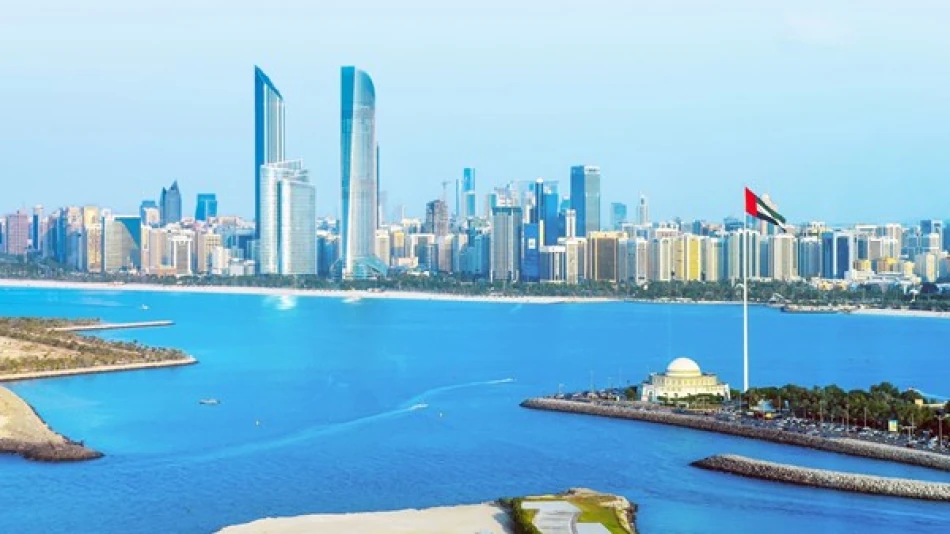
Abu Dhabi Declared World's Safest City for 9th Consecutive Year
Abu Dhabi Claims World's Safest City Crown as Gulf States Dominate Global Security Rankings
Abu Dhabi has secured the top position in global city safety rankings for mid-2025, marking the ninth consecutive time the UAE capital has claimed this prestigious title. With a safety score of 85.2 out of 100 and the world's lowest crime rate at just 11.25 points, the achievement underscores the Gulf region's emergence as a premier destination for international talent and investment in an increasingly uncertain world.
The Numbers That Matter
According to Numbeo's Global Statistics report, Abu Dhabi's dominance in safety metrics reflects more than just effective policing—it represents a comprehensive approach to urban governance that other global cities are struggling to match. The emirate's crime index of 11.25 points places it dramatically ahead of traditional safe havens like Prague (24.61 points) and Beijing (25.37 points).
The gap becomes even more striking when compared to major Western cities: Sydney scored 34.22 points, Berlin 44.61, and New York 51.05. London, often considered one of Europe's safer capitals, registered 55.34 points—nearly five times higher than Abu Dhabi's crime rate.
Beyond Safety: The Economic Implications
Talent Magnet in a Fragmented World
Abu Dhabi's safety record isn't just a badge of honor—it's becoming a critical competitive advantage in the global talent wars. The city hosts over 200 nationalities, creating a cosmopolitan environment that combines security with opportunity. As remote work reshapes global employment patterns and professionals gain more location flexibility, cities offering both safety and quality of life are capturing disproportionate value.
This trend mirrors Singapore's rise as Asia's financial hub, where safety and stability attracted international businesses seeking alternatives to Hong Kong's political uncertainties. Abu Dhabi appears to be following a similar playbook, positioning itself as the Gulf's answer to Switzerland—a neutral, secure base for global operations.
Investment Climate Advantages
For institutional investors and multinational corporations, Abu Dhabi's safety metrics translate directly into lower operational costs. Reduced security expenses, lower insurance premiums, and minimal business disruption from civil unrest create compelling economic incentives. The emirate's stability also offers predictable regulatory environments—increasingly rare in a world where policy volatility has become the norm.
The Gulf's Strategic Security Model
Abu Dhabi's success reflects broader trends across Gulf Cooperation Council states, where substantial investments in technology-driven security infrastructure have paid dividends. The emirate's approach combines traditional law enforcement with smart city technologies, creating comprehensive surveillance and response systems that prevent crime rather than merely responding to it.
This model contrasts sharply with reactive security approaches in cities like New York or London, where resource constraints and privacy concerns limit preventive measures. Abu Dhabi's relatively smaller population and centralized governance structure enable more intensive security coverage—a luxury unavailable to sprawling metropolises.
Global Context and Future Implications
The rankings reveal a broader shift in global urban hierarchies. Traditional Western capitals are losing ground not just to Gulf cities, but to emerging Asian centers prioritizing public safety. Beijing's third-place finish, despite China's authoritarian reputation, suggests that effective governance—regardless of political system—increasingly trumps democratic credentials in safety outcomes.
For Abu Dhabi, maintaining this position will require continued investment as the city scales. The emirate's population growth, driven by economic diversification beyond oil, could strain the intimate security model that currently works so effectively. However, early indicators suggest Abu Dhabi's leadership understands this challenge, with ongoing investments in AI-powered security systems and community policing initiatives.
The broader message is clear: in an era of global uncertainty, cities that can guarantee basic security and stability are becoming premium destinations for both human and financial capital. Abu Dhabi's ninth consecutive victory in safety rankings isn't just about crime statistics—it's about establishing the foundation for long-term economic competitiveness in an increasingly mobile world.
Most Viewed News

 Layla Al Mansoori
Layla Al Mansoori






